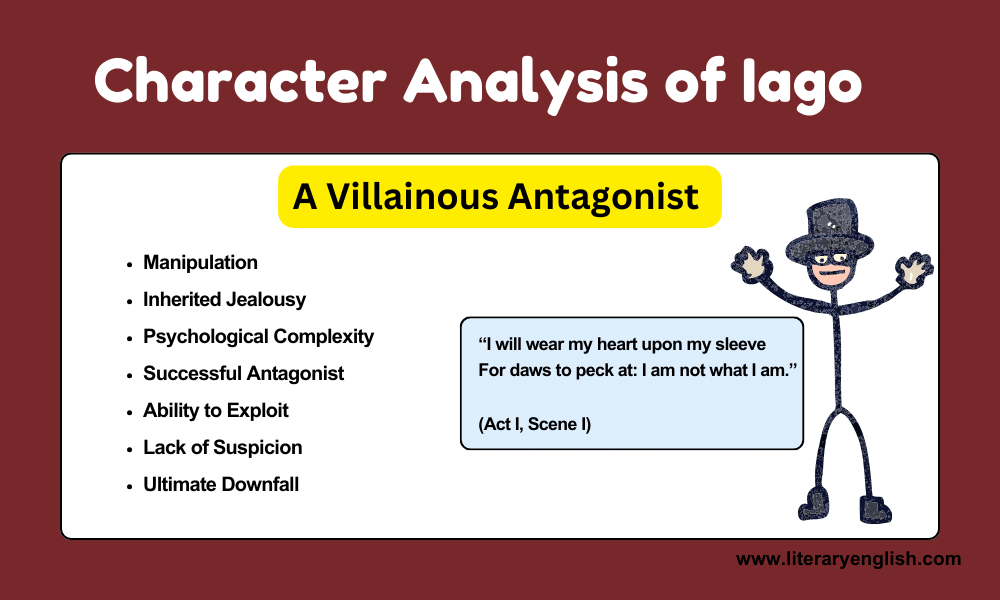Iago is one of Shakespeare’s most notorious and enigmatic antagonists. His villainous role and psychological manipulations make him a perfect villain. In this article, we will discuss character analysis of Iago, his villainous role and effectiveness as a successful antagonist in the play Othello.
“And what’s he then that says I play the villain?
When this advice is free I give and honest,
Probal to thinking, and indeed the course
To win the Moor again?”
(Act II, Scene III)
Character Analysis of Iago
Manipulation
Iago’s brilliance lies in his unparalleled ability to manipulate those around him. His strategic mind allows him to exploit the weaknesses and vulnerabilities of others to further his own schemes. By presenting himself as “honest Iago,” he earns the trust of Othello, Cassio, and even his own wife, Emilia. This facade of honesty is his most potent weapon, enabling him to plant seeds of doubt and discord without arousing suspicion.
Inherited Jealousy
Jealousy is the key factor that triggers Iago’s villainous role. Below are the few points that enhance Iago’s jealousy.
- Iago’s resentment towards Othello stems from being overlooked for the lieutenant position, which is given to Cassio. This professional slight ignites his desire for revenge.
- Racial prejudices may also influence Iago’s disdain for Othello, as Othello is a Moor. This underlying racism fuels his animosity and contempt.
- Iago harbors baseless suspicions that Othello has been involved with his wife, Emilia. This personal vendetta adds another layer to his malevolence.
- Some interpretations suggest that Iago is driven by a fundamental malignancy, a pleasure in causing chaos and suffering without a clear, rational motive.
“I hate the Moor:
And it is thought abroad, that ‘twixt my sheets
He has done my office: I know not if’t be true;
But I, for mere suspicion in that kind,
Will do as if for surety.”
(Act I, Scene III)
Psychological Complexity
Iago’s psychological depth makes him a fascinating character:
- Iago embodies duality, projecting an image of loyalty and honesty while concealing his true malevolent intentions.
- Iago’s understanding of human nature is profound. He knows precisely how to exploit Othello’s insecurities about his race and Desdemona’s fidelity.
- Throughout the play, Iago shows no remorse for his actions. His cold, calculating nature highlights his detachment from any moral considerations.
Iago as a Successful Antagonist
Iago’s success as an antagonist is evident in several aspects of the play.
“I will wear my heart upon my sleeve
For daws to peck at: I am not what I am.”
(Act I, Scene I)
Iago’s actions are the driving force behind the plot’s progression. His schemes lead to the unraveling of Othello’s life, manipulating events and characters to bring about the tragic conclusion. Without Iago’s machinations, the tragic events would not transpire, showing his pivotal role in the narrative.
Iago engages the audience through his soliloquies and asides, offering a glimpse into his thought process and motivations. This direct communication with the audience creates a sense of complicity, making them privy to his schemes and heightening the dramatic tension.
Ability to Exploit Others
“And thus do I ever make my fool my purse:
For I mine own gained knowledge should profane,
If I would time expend with such a snipe
But for my sport and profit.”
(Act I, Scene III)
Iago’s ability to identify and exploit the weaknesses of others is key to his success. Iago understands Othello’s insecurities about his race and Desdemona’s fidelity, using these to incite jealousy and doubt. He takes advantage of Cassio’s ambition and his discomfort with his own reputation to manipulate him into compromising situations. Roderigo’s infatuation with Desdemona is exploited for financial gain and to further Iago’s plans.
Lack of Suspicion
Iago’s greatest strength is his ability to operate without raising suspicion. His reputation for honesty and loyalty makes it difficult for others to see through his deceit. This allows him to manipulate events from behind the scenes, maintaining control over the narrative until the very end.
Ultimate Downfall
Despite his successes, Iago’s downfall is essential to the play’s resolution. Emilia ultimately exposed his schemes, revealing his true nature to Othello and the other characters. This exposure serves as poetic justice, ensuring that Iago’s manipulations do not go unpunished.
Conclusion
Iago in “Othello” stands as one of Shakespeare’s most masterfully crafted antagonists. His intelligence, psychological insight, and ruthless ambition make him a formidable villain. As a successful antagonist, he drives the plot through his manipulations, exploiting the vulnerabilities of those around him while maintaining an outward facade of honesty and loyalty. His ultimate downfall, brought about by his own overconfidence and the courage of those he underestimated, provides a fitting end to his reign of deceit. Iago’s character is a testament to Shakespeare’s understanding of the darker aspects of human nature, making “Othello” a timeless exploration of trust, betrayal, and the destructive power of unchecked ambition.
